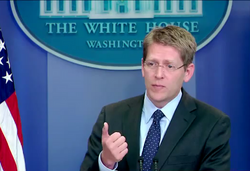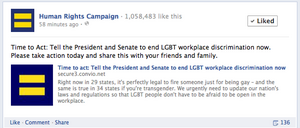News Analysis: Four Reasons Why Enacting LGBT Workplace Protections Is Different Than Ending DADT
Questions over why President Obama chose last week not to pursue an executive order to ban federal contractors from discriminating on the basis of sexual orientation or gender identity continued to be posed in the White House briefing room today, with White House press secretary Jay Carney today pulling back comments made by White House spokesman Shin Inouye less than 24 hours earlier that “the Administration hasn’t taken any options off the table.”
Today, Carney said, “Our position hasn’t changed since we started talking about this last week. At this time, we believe that the right approach is to build support for passage of [Employment Non-Discrimination Act] legislation. And I think an example of why this approach can be most effective is the way that we approached the repeal of ‘Don’t Ask, Don’t Tell.’ So, there is no change.”
Although Carney has pointed repeatedly to DADT repeal as the path for workplace protections, the White House has not responded to any of the multiple distinctions between the two goals of LGBT equality supporters.
Asked if today’s answer contradicted Inouye’s comment, Carney said, “What I just heard you say does not represent anything different from what I’ve said in the past, which is that at this time we are not pursuing an executive order. I’m not going to speculate about executive orders that may or may not be pursued in the future. What I’m saying is: Right now, we’re not.”
Today’s questioning marks the second time Carney has been asked about the executive order in the briefing in the six days since the White House decision not to issue such an executive order at this time.
 Carney today referenced the eight-minute questioning he took on the topic on Thursday, April 12, saying, “We discussed this pretty thoroughly last week, and the focus is on building the kind of support for and coalition behind passage of the Employment Non-Discrimination Act that we hope would lead to the kind of legislative action that would be especially effective in this case.”
Carney today referenced the eight-minute questioning he took on the topic on Thursday, April 12, saying, “We discussed this pretty thoroughly last week, and the focus is on building the kind of support for and coalition behind passage of the Employment Non-Discrimination Act that we hope would lead to the kind of legislative action that would be especially effective in this case.”
Asked if the administration misjudged the response from Obama’s supporters to the decision not to pursue the executive order, Carney defended the decision as “the right approach.”
He said, “The president believes that, in this case, the right approach is to try and build support for ENDA. I think that a good example, again, is to look at the approach that was taken by this administration in dealing with his commitment to repeal of ‘Don’t Ask, Don’t Tell,’ and working with Congress and working with the Pentagon to make sure that that came to pass. There was criticism at the time that we weren’t taking the right approach. In the end, I think, it has been shown to have been the right approach and to have been an effective approach in building support and ensuring that in its implementation … that the implementation itself has been extremely effective.”
There are four major distinctions between what happened surrounding DADT repeal and what is going on with the administration’s actions to advance LGBT workplace protections, distinctions thus far ignored by the White House.
First, the control of Congress was in the Democrats’ hands in the 111th Congress.
President Obama, Speaker Nancy Pelosi (D-Calif.) and Majority Leader Harry Reid (D-Nev.) all supported the goal of ending “Don’t Ask, Don’t Tell.” Now, Speaker John Boehner (R-Ohio) controls the House agenda, and he and most of his colleagues oppose ENDA. As such, ENDA has no chance of passage in the 112th Congress.
Second, although a formal moratorium on DADT discharges was not put in place prior to DADT repeal, the administration did take interim steps to lessen discrimination while awaiting legislative action on the repeal.
In fact, on Feb. 2, 2010, in his Senate testimony on the matter at a Senate Armed Services Committee hearing, then-Defense Secretary Robert Gates said that he had “directed the department to quickly review the regulations used to implement the current ‘Don’t Ask, Don’t Tell’ law, and within 45 days present to me recommended changes to those regulations that, within existing law, will enforce this policy in a fairer manner. On March 25, 2010, the Pentagon implemented the results of that review, raising the level of the officer who was authorized to initiate an inquiry or separation proceeding regarding the DADT policy to a general or flag officer in the servicemember’s chain of command.
On October 21, 2010, the Pentagon made further changes, announcing that discharges under DADT would take the approval of the service branch secretary, and only in consultation with the defense department general counsel and the undersecretary of defense for personnel and readiness. The DADT Repeal Act was not signed into law until Dec. 22, 2010.
Third, unlike with DADT repeal, the relevant agencies appear to be fully on board with the executive action being sought here.
Several sources outside the administration familiar with the process told Metro Weekly in January that a proposed expansion of the federal contractor nondiscrimination executive order to include sexual orientation and gender identity has been given the OK by both the Labor Department, which oversees federal contract compliance, and the Justice Department. To contrast, even as he was implementing the revised discharge procedures Gates told reporters back in March 2010, “I do not recommend a change in the law before we have completed the study” — a reference to the Comprehensive Review Working Group.
 Fourth, unlike the DADT discharge change, the additional effects of the proposed executive order being sought by advocates with regards to workplace discrimination have impact beyond that which would be achieved by ENDA.
Fourth, unlike the DADT discharge change, the additional effects of the proposed executive order being sought by advocates with regards to workplace discrimination have impact beyond that which would be achieved by ENDA.
The proposed executive order, by giving the Office of Federal Contract Compliance Programs (OFCCP) authority to ensure compliance with the order, would provide additional protections — available under Executive Order 11246 to employees of federal contractors discriminated against on the basis of race, religion, sex or national origin — to LGBT employees of federal contractors. Those protections would not be available to employees of federal contractors, even if ENDA were to become law.
The Human Rights Campaign is not accepting the decision as a done deal. After today’s briefing, HRC launched a campaign on Facebook, providing supporters with a form to contact the White House and Senate.
The HRC action states, “The next steps in this fight are clear: we need Senate hearings to move the Employment Non-Discrimination Act forward, and we need the President to issue an Executive Order banning anti-LGBT discrimination by federal contractors.”
The request echoes comments made to Metro Weekly on Monday, April 16, by Freedom to Work president Tico Almeida.
Almeida, who said he is still strongly pushing the White House to reconsider its decision about the executive order, also explained what should happen in the Democrat-controlled Senate, saying, “Get [Sen. Tom] Harkin [(D-Iowa), who chairs the Senate Health, Education, Labor and Pensions Committee] to do a hearing and mark-up, and get [Majority Leader Harry] Reid [(D-Nev.)] to take it to the floor. This is the test of their sincerity on a legislative strategy. If they can get that done, it shows that they’re making a good-faith effort. If they can’t get Tom Harkin to hold both a hearing and a mark-up, then it seems to me that they’re not really trying.”
Support Metro Weekly’s Journalism
These are challenging times for news organizations. And yet it’s crucial we stay active and provide vital resources and information to both our local readers and the world. So won’t you please take a moment and consider supporting Metro Weekly with a membership? For as little as $5 a month, you can help ensure Metro Weekly magazine and MetroWeekly.com remain free, viable resources as we provide the best, most diverse, culturally-resonant LGBTQ coverage in both the D.C. region and around the world. Memberships come with exclusive perks and discounts, your own personal digital delivery of each week’s magazine (and an archive), access to our Member's Lounge when it launches this fall, and exclusive members-only items like Metro Weekly Membership Mugs and Tote Bags! Check out all our membership levels here and please join us today!




















